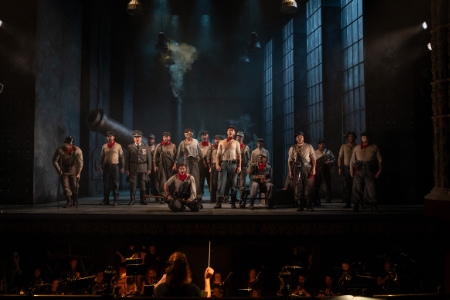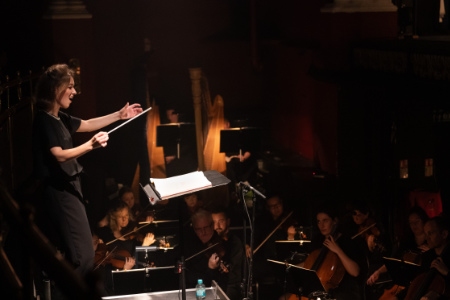Catch Elaine conducting Gounod's Faust
Gounod's Faust is showing at the Gaiety Theatre from 1-7 October.
Book Now
Elaine Kelly is the resident conductor of Irish National Opera. She has conducted several INO productions including Peter Maxwell Davis’ The Lighthouse, Amanda Feery’s I Thing I Cannot Name, and is currently at the helm of our production of Gounod's Faust. In this exclusive interview conducted during rehearsals, we delve into her experiences, insights, and more.
Q: Can you tell me about your background and journey to becoming a conductor? How did you become interested in conducting operas specifically?
A: I began learning the violin at the age of three and spent so much of my school-going years playing in orchestras and singing in choirs. For me, there was no doubt that I would go on to study music in college and that music would be my career. I entered the Cork School of Music and it was during this time that I was introduced to conducting as one of my modules. I immediately loved it and enjoyed learning the gestures, the technique and nuances. I had always enjoyed playing or singing as a group in a choir or orchestra, that collective sound as opposed to solo playing on my violin, and now having the opportunity to stand in front of a large number of people and shape the sound is thrilling!
I went on to study for my Masters in Conducting and during that time I also participated in conducting masterclasses and workshops to further develop my skill. I began conducting choirs and orchestras in the community – practically every evening of the week to gain as much experience as possible! And in 2014 I won the inaugural Conducting Competition at the Feis Ceoil which led to my professional debut with the RTÉ Concert Orchestra.
I saw that Irish National Opera were calling for applicants for the new year of their Opera Studio, in which they provide training and support to young singers, conductors, composers, répétiteurs, directors who are on the cusp of a professional career. As I had choral and orchestral experience, I was intrigued to explore operatic conducting and so I applied. Thankfully, I was accepted onto the Studio and thus began my career in conducting operas!

Q: What drew you to this opera? Is there something unique or special about it that resonates with you?
A: I have always enjoyed conducting French music, the sound world, the orchestration, the colours, the nuances really appeal to me. Faust is one of the greatest masterpieces of all time and so I was very excited when offered to conduct this opera. I love every single note of it. It’s rich, romantic, lush, exciting, playful, dark, terrifying – the music is incredibly theatrical and that’s what makes it so fun to conduct. Playing with the music of each character and setting every scene with music like this. It has some of the most famous and beautiful arias, which challenge both the voice and orchestra, fantastic characters, interesting storyline which covers many topics that were very popular at the time of its composition but also remain relevant today like love, passion, a life full of regrets, the need of a second chance, fate, Heaven and Hell. What's not to love?!
Q: Could you describe the process of preparing for an opera? How do you work with the cast, orchestra, and other members of the production team?
A: It's a very long and slow process. I start to study the score months and months in advance on a daily basis. Today we're very lucky because we can just open our laptops and watch numerous performances to get an idea of the piece and of the productions around the world and have access to the very best of recordings. I start with this. Then, I dive into the score page by page starting by learning the text and the meaning of the words (operas can be in many languages including French, Italian, German, so there is a lot of translation to be done). Through the language I start slowly to get a feeling for the character, who they are, what they want, what they dream about and then I look at the music bar by bar, note by note trying to marry the musical ideas to the language and create, page by page, a virtual opera in my mind.
After months of this preparation, we then enter production rehearsals which is the most exciting time. I love working in the room with the cast, the production team, the orchestra and just being part of this adventure. My favourite part of the production rehearsals is when I get to discover again and again every inch of the opera when working with the director and cast and having the opportunity to play, grow and develop our ideas. I love being part of this huge team, all bringing our ideas, thoughts and skills to the table, sewing them together and making something beautiful which we present to the world on opening night!

Q: What are some of the challenges you face when conducting an opera, and how do you overcome them?
A: The biggest challenge (but also the greatest buzz!) is keeping everybody onstage, offstage, in the pit – the entire room together from beginning to end of an opera. There are 50 and upwards musicians in the pit, their sound having to reach both the stage for the singers and also the seats at the very back of the hall, but also be well balanced in order to hear the singers. The cast onstage need to be with me and the orchestra while also moving and acting the entire time, projecting out to the hall. Then you have the full chorus who sing both onstage and offstage (when offstage they follow monitors of me conducting). Then there are also many people working backstage during performances: stage managers, crew, costume, technicians who are all taking cues from the conductor and the music.
If you manage to have everybody in your hands (literally!) the second challenge would be leading all towards something incredibly special, a vision of the opera so convincing that everybody is united, one that carries everyone in the room out of the life they are living directly into Faust's desires, Méphistophélès’s jokes, Marguerite’s fragile moment and we can achieve that it will be an opera you'll never forget!
Q: Opera involves a collaboration of many different artistic disciplines, such as singing, acting, orchestration, and staging. How do you coordinate and balance these elements to create a cohesive and impactful performance?
A: It’s the balance between being a great leader and having control of a room and also having the right environment where everyone feels free to express themselves, be involved, creative and spontaneous. In opera you are working with the largest team of people who are all incredibly and wonderfully talented, everyone in the room is necessary to making the opera work and to making it be the best it can be. It’s this balance and the understanding that everyone involved is there to make fantastic art. And in the end, it’s the belief that the music has the final word. That in those pages and pages of the orchestral score everything is already there, and we are trying to serve this music.
Q: What advice would you give to aspiring conductors who are interested in pursuing a career in opera?
A: Get involved! Attend rehearsals of operas to learn about the room and how a production is made, go to live performances and immerse yourself, watch performances online, read about the composers, the times they lived in and composed their operas in, talk to conductors, to singers, to musicians. It is a long process, years of study, preparation, experience are necessary but it’s a fun road and the career itself is a rewarding and thrilling one. I count myself as very lucky every day in rehearsals and as I take the podium each evening for performance.